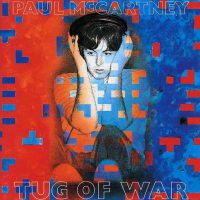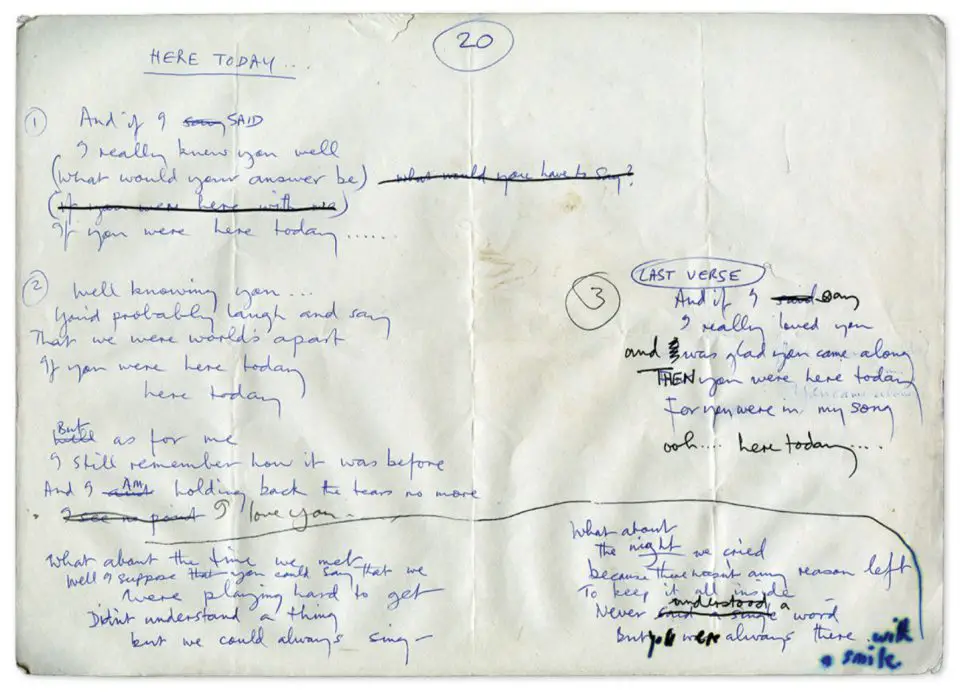
Recorded: c.March-December 1981
Producer: George Martin
Released: 26 April 1982
Available on:
Tug Of War
Back In The World
Back In The US
Good Evening New York City
Personnel
Paul McCartney: vocals, guitar
Jack Rothstein: violin
Bernard Partridge: violin
Ian Jewel: viola
Keith Harvey: cello
Written in 1981 as a tribute to John Lennon, ‘Here Today’ was a moving highlight of Paul McCartney’s 1982 album Tug Of War.
At least once a tour, that song just gets me. I’m singing it, and I think I’m OK, and I suddenly realise it’s very emotional, and John was a great mate and a very important man in my life, and I miss him, you know? It happened at the first show, in Gijon: I was doing fine, and I found myself doing a thing I’ve done in soundcheck, just repeating one of the lines: ‘I love you, I love you, I love you.’ I did that and I thought, ‘That’s nice – that works.’ And then I came to finish the song, to do the last verse, and it was, ‘Oh s**t – I’ve just totally lost it.’
The Guardian
‘Here Today’ was composed less than a year after Lennon’s death. The song took the form of an imaginary conversation between the two former Beatles, and contains some of McCartney’s most heartfelt and honest lyrics.
I was kind of crying when I wrote it. It’s like a dialogue with John. One of my feelings even when he used to lay into me was that he really didn’t mean it. I could always see why he was doing it. There was this spectrum of me, which I understand because he had to clear the decks just like I did. In the song, John would hear me saying that and say, ‘Oh, piss off! You don’t know me at all. We’re worlds apart. You used to know me but I’ve changed.’ But I feel that I still knew him. The song is me trying to talk back to him, but realising the futility of it because he is no longer here, even though that’s a fact I can’t quite believe, even to this day. The ‘I love you’ part was hard to say. A part of me said, ‘Hold on. Wait a minute. Are you really going to do that?’ I finally said, ‘Yeah, I’ve got to. It’s true.’
A verse in ‘Here Today’ refers to an incident during The Beatles’ first full American tour, when they had a day off in Key West, Florida. Much of the day was spent drinking alcohol and jamming with members of the tour’s support acts.
We were in Key West in 1964. We were due to fly into Jacksonville, in Florida, and do a concert there, but we’d been diverted because of a hurricane. We stayed there for a couple of days, not knowing what to do except, like, drink. I remember drinking way too much, and having one of those talking-to-the-toilet bowl evenings. It was during that night, when we’d all stayed up way too late, and we got so pissed that we ended up crying – about, you know, how wonderful we were, and how much we loved each other, even though we’d never said anything. It was a good one: you never say anything like that. Especially if you’re a Northern Man.
The Guardian
Recording began in the summer of 1981 in the loft of The Mill at his Sussex home; the building was later renovated and became Hog Hill Mill studio. A string quartet, arranged by George Martin, was subsequently overdubbed onto McCartney’s acoustic guitar backing, although both men were wary of the song sounding too similar to The Beatles’ ‘Yesterday’.
I thought, well, this is stupid, it’s like saying because you’ve used a guitar once in 1980 you should never use a guitar again. It’s silly condemning the format of a string quartet just ’cause we’d used it once on a famous record – you know, ‘Yesterday’. So I then said to George look, let’s just try a string quartet, let’s get it all worked up, let’s do it. There’s no reason why we shouldn’t keep using string quartets till we drop.
‘Here Today’ was never released as a single, although it reached number 46 on the Billboard Mainstream Rock charts in the USA. It became a core part of McCartney’s live shows after being added to his set for the Back In The US tour in 2002.
I was worried that it might not be good enough and that someone might think I was trying to cash in on it or something. I was kind of crying when I wrote it. I’m sure you understand why without me going into it all. His death is something that the three of us find very difficult to talk about, even to each other.
The lyrics to ‘Here Today’ appear in McCartney’s poems and lyrics anthology Blackbird Singing, where they are given the title “Here Today (Song for John)”. It also appeared in 2021’s The Lyrics: 1956 To The Present.
It’s a very charged experience to perform this song in concert. It’s just me and a guitar. In the current show, I do ‘Blackbird’ and then ‘Here Today’, and I’m stuck in the middle of a great big arena with all these people, and a lot of them are crying. It’s always a very sentimental, nostalgic, emotional moment.
The Lyrics: 1956 To The Present



OMG no one has comments about one of Paul’s best song. I had the honor of being at Paul’s show at Citi field and seeing him perform it almost had me crying. miss you and love you John
Heard this song for the first time! Where have I been! Made me cry. Beautiful Song. I had bought John Lennon’s album , Imagine ,when I was 13. My favorite. Still is. I the vinyl records were not made so well it would worn it out. Miss Lennon. I praise him for all the wonderful music and his thought on paper that he left behind. { not all perfect,but who is}.
LOVE THIS SONG. The first time I heard it was about as close as I ever got to crying over a song. I mean, just say that phrase to yourself– “if you were here today.” 🙁 I learnt it on the guitar and played it for my friend and she nearly broke down, too.
It’s also one of the few songs in which the lyrics matter to me as much as or (dare I say it?) more than the music…
I heard this song live the day before yesterday in Vienna. Paul sang it beautifully ?
And I just couldn’t hold my tears back.
Miss you, John!…
I’m a 2nd gen fan, born right before The White Album was launched. Understand that, pre-internet, we just weren’t culturally aware as now. A new record would be released and, if not a reader of Rolling Stone or stumbling across the odd-off review in a major newspaper, you found out about it either by hanging around your local record shop or if it had a decent 45rpm single or album cut on it, on the radio.
I found out about “Tug Of War” through “Ebony and Ivory.” It was all over the Tampa FM radio in Florida in ’82 & still one of my favorite solo Paul songs. I rushed to buy the 45rpm (and still sharply recall the picture sleeve featuring that image of Stevie and his mirrored Rayban aviators some 40 yrs later) . “Ebony & Ivory” is a song today’s world could benefit from more than ever, but the modern entertainment industry would only ridicule the notion.
When my brother gave me a copy of “Tug Of War” that Christmas (and I still recall tearing the shrink-wrap off the LP almost exactly 40 years ago, and I still have that same copy in my collection), I played the record, gob-smacked with “Here Today.” Reading the lyrics on the inner, you knew instantly what this song was about. The song left me shaken, for it was so unlike McCartney to expose something so frikkin’ real about himself. Paul always played his true emotions close to his chest. Even Paul compositions like “The Long & Winding Road” (or anything he said or sung during the Anthology) didn’t reveal the delicate and intense grief that “Here Today” exposes. Being such a good songsmith, I can’t decide if Paul wrote this as a vehicle for his fans or as legitimate declaration of his true feelings as Paul was (is) never one to drop all pretense, be it in song or especially interview. There’s always that wall separating Paul (the personal) from Paul (the celebrity). Not that I blame him. He’d been under the most intense public scrutiny since becoming an adult and he either had to develop the ability to save some private part of himself for himself & his family or end up becoming Elvis. Even Lennon, in his interviews and 1970-1971 music, was bullshitting when he dismissed his Beatles work. I suspect John was proud of his 60s work, really proud, but had to hide his love away [pardon the pun] because of a seriously insecure spouse and very elusive muse.
“Here Today” gets really fascinating because even as Paul tries to lift himself out of his funk using nostalgia (the uplifting bridge, “But, as for me, I still remember how it was before…”), he quickly surrenders to his aching grief (“… but I am holding back the tears no more”) which allows George Martin to expose his own sadness – through viola and cello. George Martin’s quartet score takes the song to such a higher level, without soppiness, that I think he deserved a co-writing credit. It’s almost a duet between Paul on acoustic & George’s strings, not unlike the two Paul & Stevie tracks found elsewhere on the album.
This could be the most honest song Paul ever released. It is quite different than most of his other work, because there’s no paean to celebratory love, no happy ending, no sense of closure. The sadness continues until the turntable needle glides into the inner groove and silence prevails. I remember being a fan and having to get up and lift the needle from the record at that point and finding it emotionally beneficial as either I remained melancholy or I flipped the disc over quickly to allow the fun of “Ballroom Dancing” to distract me. (This is a special unique feature of the LP which is denied on CD making “Tug Of War” a mandatory vinyl experience.)
George Martin’s quartet score takes the song to such a higher level, without soppiness, that I think he deserved a co-writing credit.